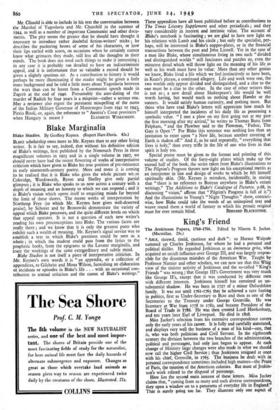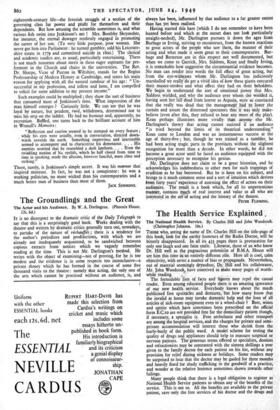King's Friend
The Jenkinson Papers, 1760-1766. Edited by Ninetta S. bicker. (Macmillan. 28s.) "ABLE, shrewd, timid, cautious and dark ": so Horace Walpole summed up Charles Jenkinson, for whom he had a personal and political dislike. He regarded Jenkinson as an eminence grise, who acquired an occult influenmover George III, and was largely respon- sible for the disastrous mistakes of the American War. Taught by Professor Namier and other scholars, we can now see that this Whig view of the sinister activity of Jenkinson and the so-called " King's Friends " was wrong,;'that George HI's Government was very much like George II's, except that it was conducted by different men with different interests. Jenkinson himself has remained an un- substantial shadow. He was born in 1727 of a minor Oxfordshire family. It was not until 1761-1765 that he achieved a sure footing in politics, first as Under-Secretary to Bute and then as .one of the Secretaries to the Treasury under George Grenville. He was Secretary at War front 1778 to 1782, and became President of the Board of Trade in V786. He was then created Lord Hawkesbury, and ten years later Earl of Liverpool. He died in 1808.
Miss Jucker's selection from his extensive correspondence covers only the early years of his career. It is fully and carefully annotated, and displays very well the business of a man of his kind—one, that is, who was both politician and Civil Servant. In the eigtheenth century the division between the two branches of the administration, political and permanent, had only just begun to appear. At each change of Ministry large changes were also made in what we should now call the higher Civil Service ; thus Jenkinson resigned at once. with his chief, Grenville, in 1765. The business he dealt with in personal correspondence sometimes included high matters—the Peace of Paris, the taxation of the American colonies. But most of Rain; son's work related to the disposal of patronage.
Here lies the second main interest of these letters. Miss Jucker claims that, "coming from so many and such diverse correspondents, they open a window on to a panorama of everyday life in England." That is surely going too far. They illustrate only one aspect of eighteenth-century life—the feverish struggle of a section of the governing class for power and profit for themselves and their dependants. But how amusing the scramble sometimes is, and what various fish swim into Jenkinson's net ! Mrs. Boothby Skrymsher, for instance, the eternal dowager restlessly engaged in promoting the career of her son. (To very little purpose, poor woman. She never got him into Parliament : he turned gambler, sold his Leicester- shire estate in 1779 and committed suicide in 1800.) The clerical and academic toadies are, as usual, particularly entertaining. There is not much nonsense about merit in these eager aspirants for pre- ferment in the Church and chairs in the universities. The ReV. Dr. Sharpe, Vicar of Purton in Wiltshire, stands for the Regius Professorship of Modern History at Cambridge, and states his main -reason for applying with all the natural candour of his age : " Un- successful in my profession, and infirm and lame, I am compelled to solicit for some addition to my present income."
Such examples could be multiplied ; they show the sort of business that consumed most of Jenkinson's time. What impression of the man himself emerges ? Curiously little. We can see that he was loyal by nature, but prudent, ruse, withdrawn, determined not to miss his step on the ladder. He had no humour and, apparently, no recreation. Baffled, one turns back to the brilliant account of him in Wraxall's Memoirs:
"Reflection and caution seemed to be stamped on every feature ;
while his eyes were usually, even in conversation, directed down- wards towards the earth. Something impervious and inscrutable seemed to accompany and to characterise his demeanour. . . . His enemies asserted that he resembled a dark lanthorn. . . . Even the twinkling motion of his eyelids, which he half closed from time to time in speaking, made the allusion, however fanciful, more close and striking."
There, surely, is Jenkinson's simple secret. It was his manner that inspired mistrust. In fact, he was not a conspirator: he was a working politician, no more wicked than his contemporaries and a much better man of business than most of them.
JACK SIMMONS.



































 Previous page
Previous page